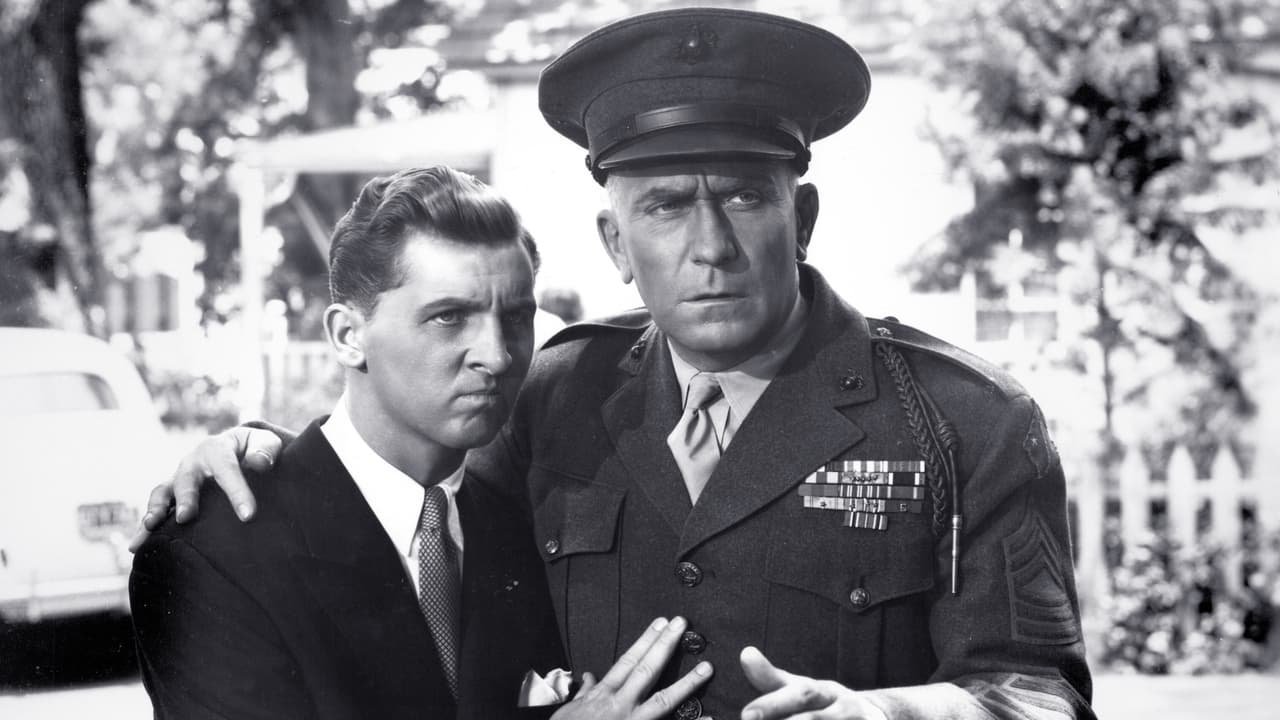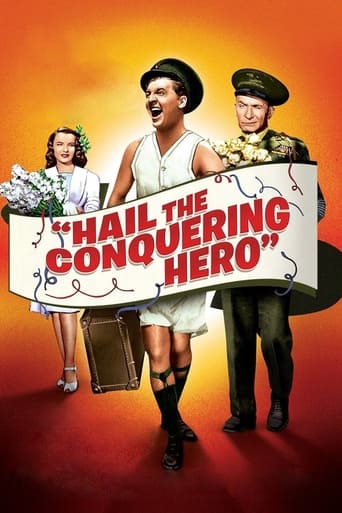

Watch something else. There are very few redeeming qualities to this film.
... View MoreI have absolutely never seen anything like this movie before. You have to see this movie.
... View MoreA lot of perfectly good film show their cards early, establish a unique premise and let the audience explore a topic at a leisurely pace, without much in terms of surprise. this film is not one of those films.
... View MoreThe acting in this movie is really good.
... View MoreThis Preston Sturges film is a wartime comedy with more to it than appears on the surface. It's a good story with a plot that is well developed. The situation comedy is plain for all to see. Eddie Bracken's Woodrow Truesmith returns home after being away for a year, supposedly for wartime service overseas. William Demarest, as Sgt. Heppelfinger, heads a group of Marines who are back in the States from Guadalcanal, and who concoct a ruse to make Woodrow a hero back home. There are more details but this sets the stage for much of the story. Yet, underlying this is a message about nonmilitary service in wartime. It's no disgrace that Woodrow was medically discharged from the Marines after one month of training. And, people who fill civilian jobs back home also are important to the war effort. None of this is overtly obvious, so that it doesn't become a preachy film. But that nice, subtle message is there. Bracken does a good job in his role, but I think Demarest was especially good as the sergeant. The rest of the actors were all quite good. The film has a sizable cast with several notable character actors of the day. Franklin Pangborn plays the reception committee chairman in a frenzied, disorganized and pompous way that was a trademark of many of his roles. Raymond Walburn as Mayor Noble had some of the best lines in the movie – a good number of lines. He played his role superbly well and clearly provided must of the humor in the film. He had many snappy, very funny quips and lines. Which lead me to think that the film also was something of a spoof of politics. Even the stereotyping of Marines as not well educated gets a pass. This bunch is seen as caring and considerate men, even with their toughness. In the end, Woodrow swallows his pride and tells the town folk the truth. Honesty once again proves to be the best policy.
... View MoreThis typically madcap Preston Sturges satire about a 4F Marine reject (Eddie Bracken, suffering from chronic hay fever) who ultimately proves his bravery by admitting his cowardice makes a fitting companion piece to 'The Miracle of Morgan's Creek'. But perhaps it needs to be seen in the proper historical context of wartime deprivation and homefront morale boosting. Unlike the more daring comedy of the earlier film Sturges here wants to have it both ways: mocking the gullibility of Main Street USA while at the same time celebrating its innocence. Mom and apple pie emerge triumphant, as does the little soldier, and the war effort is well served in the process. Sturges was always a master of sophisticated slapstick entertainment (an oxymoronic combination to most comedy filmmakers), but this time his famous dialogue was more fast than furious, if at least delivered with familiar gusto by the director's usual company of stock players.
... View MoreWhat makes a hero? That's the essential question being addressed by this movie which is, at one and the same time, both a funny piece of escapism for a war-weary population and a very thought-provoking study of heroism.Eddie Bracken is Woodrow Truesmith, son of a World War I Marine and grandson of a Civil War veteran. Given his family history, Woodrow is, of course, expected to serve honourably in World War II but when he goes to enlist he's rejected for chronic hayfever. Unable to bring himself to tell his mother the news, he tells her he's been sent overseas. One day he meets a group of real Marines (headed by Sgt. Heppelfinger, played very well by William Demarest) and shares his story. They arrange to take him home and have him pose as a veteran of Guadalcanal. I admittedly had some trouble with the plot. From what I know of the Marines, I doubt they'd take kindly to someone posing as a veteran of Marine battles, let alone set the whole thing up. That aside, however, once Woodrow gets home with his new Marine buddies the story takes on a life of its own. Woodrow is suddenly portrayed as a great hero. He's met by bands and given the keys to the city by the typical movie version of the small town mayor (Raymond Walburn). Then the town decides to erect a monument in his memory. Then, the opponents to the mayor draft him to run against the mayor. One lie leads to another, and Woodrow can't get out of it. In the meantime, his re-appearance in town causes emotional angst for his former girlfriend Libby (Ella Raines) who's now engaged to be married to the mayor's son, but who really still loves Woodrow.It's fascinating to watch a little lie take on a life of its own and grow beyond anyone's wildest imagination. It's also interesting to watch Woodrow's torment. He knows he's no Marine hero, but no one will let him out of the story. Every time he tries to explain, he gets shouted down by those who don't want the truth; they just want to live with the hero image. Eventually, though, Woodrow becomes a hero. Here's where the study of heroism comes in. Heroes in wartime are usually those who fight the battles and kill the enemy. Woodrow never did that, but his heroism will ultimately be defined not by wartime battles, but by honesty and integrity and a real courage, as - in a powerful scene near the end of the movie - he faces the town's citizens and finally tells all, admitting the deception in such a way as to let the town know he's no hero, but that will also protect the reputation of the Marines who got him into this in the first place.This is a very good movie featuring a fine story and a collection of excellent performances. It should definitely be watched. 7/10
... View MorePreston Sturges wrote and directed the 1944 film "Hail the Conquering Hero," which stars Eddie Bracken, William Demarest, Ella Raines and Franklin Pangborn. Bracken is Woodrow Truesmith, whose father was a famous war hero. Woodrow, however, is 4F because of hay fever. Discharged and depressed, he sits in a bar delaying going home. He confesses the truth to some marines he meets in a bar, and they decide to accompany him home to back up the story he told his mother - that he's in a hospital overseas due to war injuries. When he arrives home, he has a hero's welcome. Later there's a statue and a song. Then the town wants him to be mayor.Sturges' gift was coming up with wacky plots, while others of the era could create wacky situations within a plot. This one is pretty outrageous. As Woodrow feels more and more guilty, the public adulation becomes bigger and bigger. It's a strong message about people believing what they want to believe and their need for a hero.Bracken plays his role very seriously and lets the situation and the lines get the laughs. His character looks and feels trapped. Ella Raines plays his ex-fiancée, and she's very beautiful - a cross between Jeanne Crain and Gene Tierney, she gives a very sweet and sincere performance. She was a very underrated actress and beauty who for some reason never reached the top tier of stardom; today she is remembered for some wonderful film noirs in which she appeared. William Demarest is very funny as the marine helping to keep the story alive - at any cost.I enjoyed "The Lady Eve," "The Palm Beach Story," and "Sullivan's Travels" better, mainly because of their casts, but for Sturges fans, this is a must see.
... View More